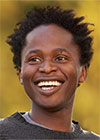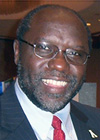I am extremely pleased that Ishmael Beah, a Sierra Leonean author and human rights activist, will be one of the plenary speakers at the NAFSA 2015 Annual Conference & Expo in Boston. As a young boy, Beah survived a rebel attack during a civil war that killed his parents and two brothers. At the age of 13, he became a child soldier for the government army and fought for more than two years before being rescued by UNICEF.
 The plight of children affected by these senseless wars was brought home to me in Tanzania. In 1996, I met a young Rwandan Tutsi refugee who escaped a massacre there in 1994. This boy, who at the time seemed to be between 13 and 14 years old, told a story of how he managed to survive by pretending to be dead by laying amidst bloodied dead family members and neighbors. This boy was psychologically and emotionally traumatized by what he had lived through and was experiencing nightmares at the time. As I listened to his story, I remember thinking to myself, how can this child be rehabilitated so that he can live a normal productive life without fear or the urge to take revenge. It was only later in my adult life that I came to realize that my childhood experience was different than that of many other children, like Beah, in other parts of the world.
The plight of children affected by these senseless wars was brought home to me in Tanzania. In 1996, I met a young Rwandan Tutsi refugee who escaped a massacre there in 1994. This boy, who at the time seemed to be between 13 and 14 years old, told a story of how he managed to survive by pretending to be dead by laying amidst bloodied dead family members and neighbors. This boy was psychologically and emotionally traumatized by what he had lived through and was experiencing nightmares at the time. As I listened to his story, I remember thinking to myself, how can this child be rehabilitated so that he can live a normal productive life without fear or the urge to take revenge. It was only later in my adult life that I came to realize that my childhood experience was different than that of many other children, like Beah, in other parts of the world.
Growing up in Tanzania, I was very fortunate to have a normal childhood. I walked three to four miles each way to school that was normal by Tanzanian standards. I played soccer in the dirt with my friends, went to fetch firewood in the forest with others from my village, and got into trouble just like many other boys. I really enjoyed being a child – sometimes I wish I could return back to those childhood years in Bukoba, my hometown.
It is amazing to think that my hometown located in the northwestern part of Tanzania is only a few miles away from villages in Northern Uganda where the long-term rebellion of the Lord's Resistance Army (LRA) against the government had such an adverse significant impact on children. Thousands of them, some as young as eight, were abducted, forced to become child soldiers, and turned into sex slaves. They were beaten and forced to torture and kill friends, family, and innocent people – even forced to commit atrocities on fellow abductees. Those who attempted to escape were killed.
Beah's work as a UNICEF Goodwill Ambassador for children affected by war, as a member of the Human Rights Watch Children's Rights Division Committee, as co-founder of the Network of Young People Affected by War (NYPAW), and as the president of the Ishmael Beah Foundation, brings the world's attention to the plight of child soldiers and many children affected by wars they did not start. His work gives a voice to many silent suffering current and former child soldiers all over the world who cannot speak for themselves.
I cannot wait to meet Beah and listen to what he has to share about his experiences, how he overcame the trauma of being a child soldier, and what happens to child soldiers when their wars have ended. Truly, for them, then a different war begins.
Learn more about Ishmael Beah.
 Jesse Lutabingwa serves as a member at large on the NAFSA Board of Directors and as associate vice chancellor for international education and development and professor of public administration at Appalachian State University. He has more than 20 years of experience in international education and international development.
Jesse Lutabingwa serves as a member at large on the NAFSA Board of Directors and as associate vice chancellor for international education and development and professor of public administration at Appalachian State University. He has more than 20 years of experience in international education and international development.
